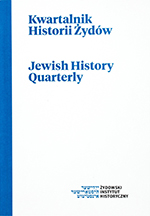The Words of the Lord: Jakub Frank at the Crossroads of Esotericism
The Words of the Lord: Jakub Frank at the Crossroads of Esotericism
Author(s): Jan DoktórSubject(s): History, Jewish studies, Jewish Thought and Philosophy, History of Judaism
Published by: Żydowski Instytut Historyczny
Keywords: Frankism; Sabathaism; esotericism; heresy; messianism; Jakub Frank
Summary/Abstract: The circumstances of the appearance of The Words of the Lord collections still remain mysterious, and the consequence of this fact is uncertainty as to their credibility and problems with placing Frank’s speeches in the appropriate historical and doctrinal context. We will not discuss here the history of schism in the Frankist camp. The thing important for us is that at the beginning of 1760 only several dozen messianic neophytes with their families stayed with Frank, of about one thousand whom he led to baptism. This group Frank calls “company”. The company stayed in the more or less the same number until 1784. In this year in January after the “big reconciliation” begins the history of publication of The Words of the Lord begins 1784. It was then, that in Brno Frank dramatically finished with the hitherto strictly observed in his environment traditions of sect esotericism, which forbade recording the doctrine and details of the sect’s internal life in writing. In the perspective of the upcoming salvation he probably did not consider the issue of multi-generational perception of these notes. He felt forced to do it and he stuck to this decision – his words were written down until his death, clearly at his own request. Up till now historians assumed that Frank’s speeches were addressed to his closest circle, first of all to the old comrades who stood by him in the messianic good times and bad times. But the vast majority of jottings, like the one cited above, is addressed to those who had not followed Frank and only now accepted his messianic calling. Frank ordered each supporter to appear at his place three times a year, but in the circumstances in Brno, with the police watching them, visits of the crowds of neophytes were not possible. Besides, Frank was not a tribune or a preacher. He taught “at the table”, and only a few could find places at the messiah’s table, and they had to fulfill the task of strengthening Frank’s authority and messianic doctrine among the remaining neophytes. The effects of writing down The Words of the Lord helped to integrate the sect. Nevertheless, in a long run, the writing down had very negative effects. When excerpts of the first written down jottings left Frank’s court, the opportunity of presenting Frank as the founder of a durable formation was lost. It was hard to create a positive image of spiritual leader based on these jottings. It was not possible to destroy all excerpts, and even the very intent to do so would disqualify both the originators and the Messiah, whose image they would attempt to protect in this way. The most serious problem in the perception of The Words of the Lord was Frank himself. The figure of messiah, which is shown in the jottings, was difficult to accept for subsequent generations of neophytes, who were brought up in a different environment and culture.
Journal: Kwartalnik Historii Żydów
- Issue Year: 259/2016
- Issue No: 03
- Page Range: 583-603
- Page Count: 21
- Language: English
- Content File-PDF

